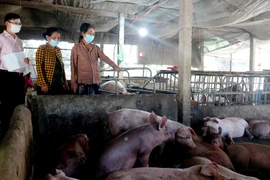 VBSP has accompanied the poor and social policy beneficiaries over the past 21 years. (Photo: VietnamPlus)
VBSP has accompanied the poor and social policy beneficiaries over the past 21 years. (Photo: VietnamPlus)Hanoi (VNA) – Over the past 21 years, loan support from the Vietnam Bank for Social Policies (VBSP) has met the needs for capital of the poor and social policy beneficiaries across the country, contributing to the socio-economic development of localities.
Helping the poor change mindset
Ta Ngai Cho, an extremely disadvantaged border commune in Lao Cai province’s Muong Khuong district is a case in point.
The commune is one of the 74 poorest communes in the country. As of the end of 2022, the poverty rate among households in the commune was 68%, while 20% of local households were just above the poverty line. The per capita income in Ta Ngai Cho was just 19 million VND (around 785 USD) a year.
However, Sung Seo Sa, chairman of the communal People’s Committee, is optimistic about the goal of reducing the household poverty rate by 10% a year. He said that in the past, local people used to lead a difficult life as they had neither capital nor farming experience, while transport to the commune was inconvenient.
Thanks to the Party and the State's investment in rural infrastructure, and assistance in farming techniques, seedlings, fertilisers, and loans from VBSP with preferential interest rates, local people have expanded their production and escaped poverty faster than ever, he said.
The family of Lu Seo Kho in Sin Chai A village is an outstanding example for local residents to follow suit.
In 2011, Kho and his wife decided to borrow money for tangerine cultivation. With a loan of 100 million VND from the VBSP, he bought 1,000 seedlings and started to grow the fruit tree.
 Lu Seo Kho and his wife take care of the tangerine garden with loan support from the Vietnam Bank for Social Policies (Photo: VietnamPlus)
Lu Seo Kho and his wife take care of the tangerine garden with loan support from the Vietnam Bank for Social Policies (Photo: VietnamPlus)While waiting for the trees to bear fruits, the family also raised pigs, chickens and cultivated sa nhan (Amomum xanthioides Wall), a member of the ginger family plant which can be used as a traditional medicine.
"Life was very hard at that time, but we worked hard and saved 20-30 million VND each year," Kho recalled.
The family was excited as they harvested 3 tonnes of tangerine in the first harvest and sold for 20 million VND.
In 2018, he expanded his farming area by an additional 2ha. The family now harvests about 30 tonnes of tangerine each year, earning between 300 and 400 million VND.
Seeing the good profit of tangerine cultivation, many households in the village have followed suit. By now, there are 110 households in the commune growing tangerines with a total area of more than 88 hectares, Sa said, adding that locals get assistance from the commune's administration in terms of seeds and fertilisers.
The commune’s poverty rate has dropped to 58% this year and it strives to reduce the rate by at least 10% per year in the future.
Sa happily said that there is no household with hunger in the commune now.
Poverty rate decreases sharply
After 21 years of development and more than nine years implementing Directive No. 40-CT/TW of the Secretariat of the Party Central Committee on strengthening the Party's leadership over social policy credit, the VBSP has gained significant achievements.
The policy credit programmes have met the need for capital of the poor and social policy beneficiaries across the country, particularly those in ethnic, remote and disadvantaged areas, contributing to creating jobs, reducing poverty sustainably and building new-style rural areas.
Total capital of localities' budget entrusted to the VBSP has so far surpassed 35 trillion VND, accounting for 10.6% of the total capital of the bank, an increase of more than 31 trillion VND compared to the period before the issuance of Directive 40.
The total outstanding balance of policy credit programmes reached 310 trillion VND by the end of September this year.
These programmes have contributed to the implementation of the three national target programmes on sustainable poverty reduction, new-style rural area building and socio-economic development in ethnic minority and mountainous areas. The poverty rate nationwide declined from 17% to 7% during 2001-2005; from 22% to 9.45% during 2005-2010; from 14.2% to 4.25% during 2011-2015 and from 9.88% to 2.23% during 2016-2021.
Over the past 21 years, social policy credit has helped more than 6.5 million households escape poverty.
The loans have helped to create jobs for more than 6.4 million labourers and provided support for nearly 3.9 million students in difficult circumstances. They were also used to build more than 18 million water and sanitation facilities in rural areas and 772,000 houses for the poor./.





























